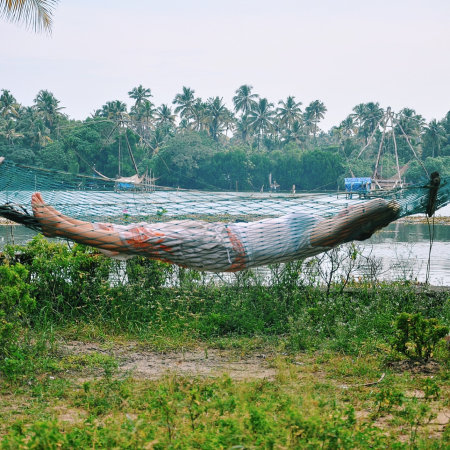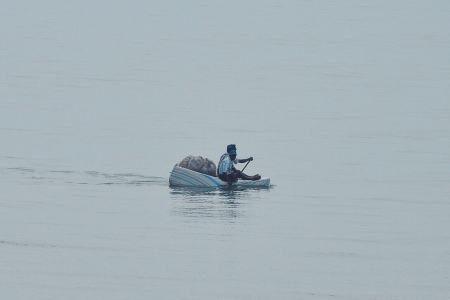Hard vs. soft
By Lonneke — November 22, 2015 04:26 pm
About two years ago, my mother and I drove to a campingsite in Spain in her camper.
This campingsite turned out to be a sort of mini-society, with neat alleys, swept leaf-free and all kinds of social intercourse rules, in which you soon became inaugurated.
What I noticed, was the amount of trouble people went through, to not go through any trouble. The collective effort was aimed at ultimate comfort. Next to every camper there's a piece of ground that's 'yours' (make sure that the sun shines upon it at the right times of day). On these pieces of land I found - except for tables, chairs and laundry racks - a special camping-washing machine; the whole neighbourhood gathered around to admire it. A washing machine, so you can wash your clothes exactly the same way you would at home. All in all it seemed to me that these people actually wanted to sojourn in their own, trusted houses, with all mod cons.
Going to the beach with my mother was such an assignment, by the time all parasols, windscreens, chairs, towels, sarongs (to lay on the sand, you don't to that on a towel, those are for drying off), bottles of water, foods, sunshades, sunglasses and a floating hose were strapped onto this super-handy trolley, I had lost all inclination for walking the 200 meters to the beach.
But if we wouldn't go about it this way, my mother assured me, we would maybe, at any time, experience some inconvenience. Nothing worse than missing something.
Why did I feel such a resistance against this way of life? Any sensible person will agree with the comfort-seeker: why wouldn't one take all possible measures to make oneself comfortable?
However, this way of reasoning is so very distant for me; I just wanna think of something and then carefree leap into action and if I happen to miss something, I don't mind at all, it doesn't bother me. Was I some sort of backward, underdeveloped specimen? Or just lazy?
Fortunately I read something about the 'twelve senses' the other day, as desribed by Rudolf Steiner (founder of anthroposophy), through which my seemingly barbaric streak makes sense after all. The importance of sense of touch is described, which concerns feeling resistance and experiencing boundaries. Without the sense of touch, we would all entirely be one, like a drop of water in the ocean: probably a divine feeling, we just wouldn't know anything about it. The sense of touch makes us able to experience ourselves as a physical human being.
Then there's also the sense of Life, which allows us to feel pain, but: this pain is needed: it has a warning function, after all. Without pain, no growth, after all we learn only through hurting ourselves regularly. Final conclusion of the piece: people who are capable of experiencing normal daily pain, can also accept the pain of FATE. How reassuring.
What it boils down to:
When I get a lift on the back of a bike, carrying a heavy bag, to the trainstation, my buttocks will feel pained and in the best case, somewhat numb. But after half a minute that sensation is gone. When I lay on a wooden bench in a rocking boat, my weight will make my shoulder- and hipbones pierce against my flesh. These are truethfull experiences, wood or iron is hard, my body has soft and hard parts. You meet the world around you. I like it when my physical experiences match the reality that I perceive around me. I don't want to be numb, I wanna feel myself moving through this world. That I come into contact with it. That I'm alive!
That doesn't mean that I will walk onto a scorching hot beach barefoot, when there's a pair of flipflops waiting at the edge. But it does mean that I will expose my soles to the hot sand, running, when there are no flipflops available, and then intensely enjoy the cool seawater, which then feels like a great reward.

